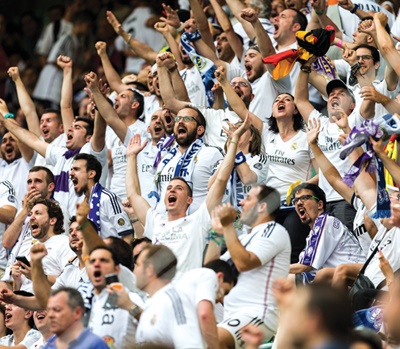EDITOR’S NOTE: The following is an excerpt from “The Real Madrid Way: How Values Created the Most Successful Sports Team on the Planet,” (BenBella Books, 2016) by Steven G. Mandis
Real Madrid seeks to help raise the self-esteem, self-confidence, joy, and happiness of hundreds of millions of people around the world. The community — the people — is the foundation. The reasons why Real Madrid’s community members participate are different, but the jubilation — and sometimes tears — unites them all. For Real Madrid’s fans and members, the community is a “means to an end, not the end itself.”
Therefore, the management team put at the center of their strategy the members’ and fans’ values and expectations. For example, if the community wants content to share, Real Madrid seeks to provide the best and most relevant exclusive content in the best and most convenient ways through Realmadrid.com and their social media accounts.
Technology enables the content for experiences and engagement to be scalable around the world. The access fuels the connection and passion, while the club’s traditions and rituals reinforce the identity association. Thus, Real Madrid’s community’s values, expectations, and desires became the touchstone for developing and aligning strategy, culture, and identity to win on the field and in business.
With this approach, Real Madrid was able to bring together a passionate global community by creating a sense of belonging and shared values felt so deeply by fans around the world that they are synonymous with one’s identity and much more. It is impossible to tell where the fan’s identity and life as a Madridista and the club’s identity and purpose start and stop. There is no question that the identity of a Madridista and the club is one and the same. The history, feelings, and emotions are intertwined.
The closest corporate examples would be Harley-Davidson, Ferrari, and Ironman, where in each case the brand and the identity, life, and lifestyle are absolutely intertwined. Owning a Harley-Davidson motorcycle allows you to be a member of the “HOG” (Harley Owners Group); buying a Ferrari allows you to be called a “Ferrarista”; finishing a 140.6-mile Ironman race allows you to call yourself an “Ironman.” The commercial power of the identity, life, and lifestyle is demonstrated by the fact that all three brands have thriving global apparel sales, sold both online and in specialized stores, yet none of them are apparel companies. A HOG, Ferrarista, Ironman, or Madridista benefits from the community with new friendships, a sense of belonging, shared experiences, recognition, and increased self-esteem. In addition, the internet and digital technology have allowed sophisticated, active community engagement.
 |
Community is at the center of everything Real Madrid is, does.
Photo by: GETTY IMAGES
|
At the center of everything Real Madrid is and does is their relationship with the community. The Real Madrid management team cares as much about bringing joy to the community and spreading and sharing the community’s positive values (far beyond the ninety minutes of a game) as they do about winning championships, in their unique way. In addition, they make efforts to reach well beyond their brick-and-mortar stadium venue via digital technology, social media, and a partnership with Microsoft; international and friendly exhibition games around the world; and Real Madrid supporters clubs to reinforce and intensify interaction and engagement.
Winning is not enough to the Real Madrid community. This is in direct contrast to the idea of “win at all costs” or “the end justifies the means,” or selecting players based on data analytics first, or “taking a calculated risk” in signing a troubled talented player that can “help the team win now.” The Real Madrid community has a different standard and demands more. They want the team on the field to reflect the values and expectations of the community, which is winning with a team philosophy, class, style, and elegance. The Real Madrid community wants the club to be “champions and gentlemen.” If the team loses, the community wants at least to see effort until the end, courage, and dignity. This is what makes them happy, and Real Madrid always tries to satisfy their needs.
Florentino [Pérez] believes that when Real Madrid represents the ideals of the community members, the community responds with more engagement, passion, and loyalty. Since Real Madrid’s community values are inclusive and universal, the community itself grows globally, which leads to worldwide sponsors spending big money for association with and access to the Real Madrid community, as well as television broadcasters paying lots of money to distribute the game to the large, passionate global audience. The passion leads to an increase in stadium receipts, the value of broadcasting rights, and marketing and sponsorship opportunities, which contribute to higher revenues. Since Florentino and his executives implemented their sustainable economic-sport model, revenues have soared as fans more closely identified with the club and their players and became more passionate and loyal. Coming full circle, the high revenues allow the club to sign the world’s best players who share their community values. Real Madrid wants their community to see a player on the team and think, “I want to play like, and be like, that player; I want my son or daughter to play like, and be like, that player; I want to win playing that style and with those values.”
The resulting increase in revenues from the community values-centric approach funds not only signing the world’s best players but a bigger, more modern venue that makes the stadium experience itself a way to connect with the team. It also provides the best training facilities and a youth academy that develop talented homegrown players who learn, from the age of seven, the history, traditions, values, and expectations of Real Madrid to complement and indoctrinate the imported stars. To the community and to Florentino and his executives, Real Madrid is much more than any one current or past player, coach, or president.
Real Madrid isn’t just providing a soccer game; they are providing a larger experience or entertainment that draws in a community member to actively participate, for a memorable sensation. It is the experience from before and after the game as well as the satisfaction of the work of the club’s charitable foundation. Off the field, the Real Madrid community wants the club to adhere to accountability, transparency, trust, and good corporate governance. Interestingly, if Real Madrid’s community feels the club has not followed their values, the club’s unique ownership structure enables those members to express their frustration by — along with not buying tickets or merchandise — voting a president out of office.
Steven G. Mandis is an adjunct professor at Columbia Business School. His book, “What Happened to Goldman Sachs: An Insider’s Story of Organizational Drift and its Unintended Consequences,” is a rigorous analysis of if, why, and how the culture of Goldman Sachs changed. Mandis worked at Goldman Sachs in the investment banking, private equity, and proprietary trading areas.





